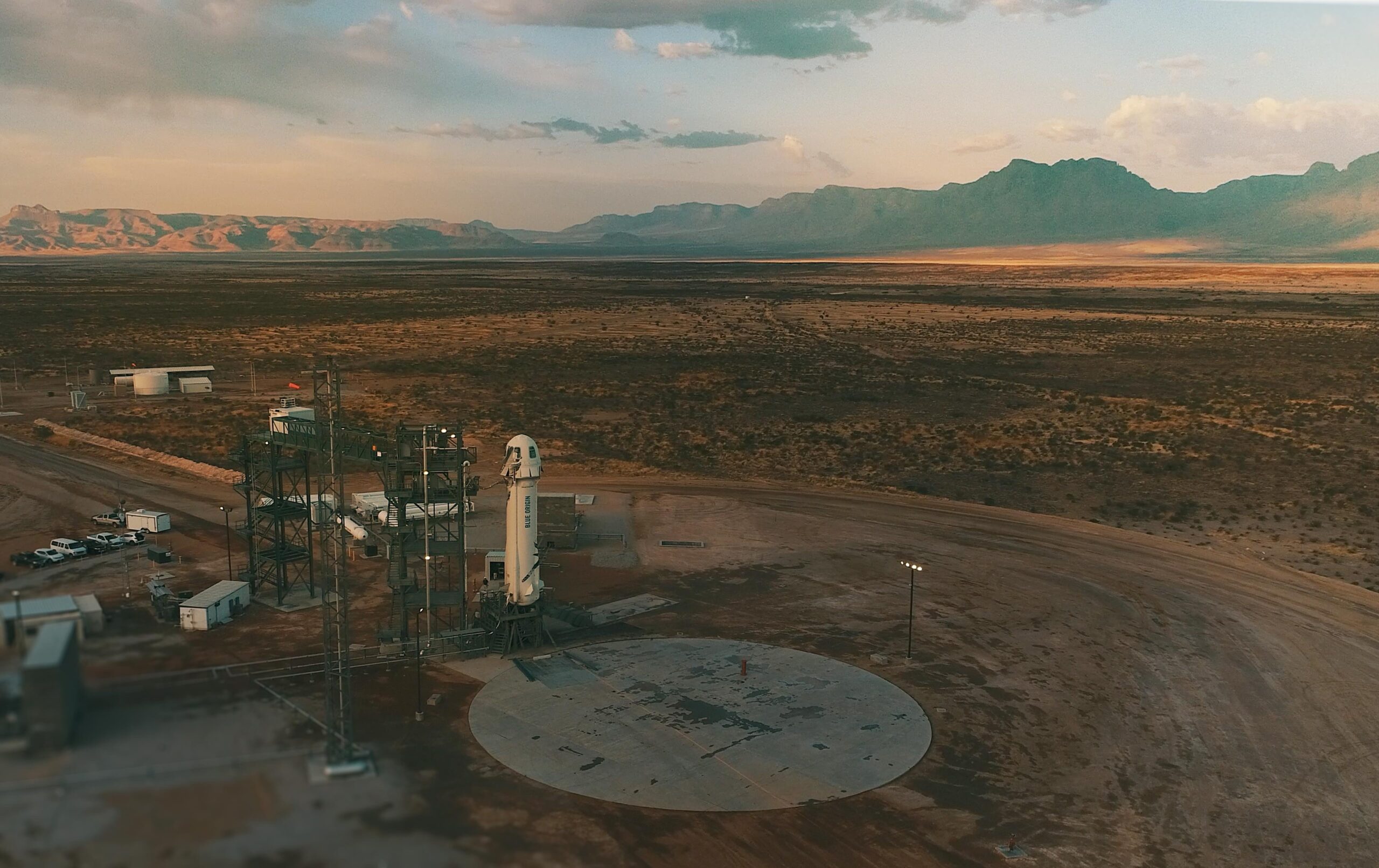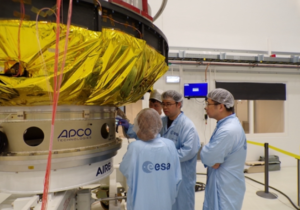
WASHINGTON — Blue Origin delayed the return to flight of its New Shepard suborbital vehicle by one day as the company’s founder says he will push the company to move more quickly on its various projects.
Blue Origin had scheduled a launch of its New Shepard vehicle from its West Texas test site for Dec. 18. However, the company first delayed the launch by an hour, citing cold conditions at the launch site, then scrubbed the launch because of an unspecified ground system issue.
The company announced on social media late Dec. 18 that it rescheduled the mission, designated NS-24, for Dec. 19, with liftoff planned for 11:37 a.m. Eastern.
The mission is the first for New Shepard since a mishap during a payload-only flight of the vehicle in September 2022. An investigation traced the NS-23 accident to structural failure in the nozzle of the vehicle’s BE-3PM engine caused by excessive heating.
Blue Origin said NS-24 will carry 33 research payloads as well as 38,000 postcards from Club for the Future, a nonprofit organization affiliated with the company. No people will be on board. The company did not list the payloads but said that more than half “are developed and flown with support from NASA.”
Danielle McCulloch, manager of NASA’s Flight Opportunities program at the Armstrong Flight Research Center, provided SpaceNews with a list of payloads NASA is supporting on NS-24. Many of them also flew on NS-23 last year:
- An in-space manufacturing innovation from Massachusetts Institute of Technology that leverages paraffin and beeswax to produce alternative options for propelling small spacecraft (on NS-23)
- A project from small business Ecoatoms Inc. in Reno, Nevada, designed to advance the production of biosensors in low Earth orbit
- An autonomous sampling system from Montana State University and University of Colorado Boulder that will use yeast as a model for understanding how microgravity affects living things
- An electrophysiological measurement system and lens-free imaging system from imec USA in Kissimmee, Florida (both on NS-23) as well as two student payloads managed by imec examining gravity’s effect on ultrasonic sound waves and on a variety of sensors
- An experiment from the University of Central Florida in Orlando to apply electric fields to a dust simulant (on NS-23)
- A tool for evaluating the geophysical properties of soil on near-Earth asteroids developed by Honeybee Robotics Ltd., in Altadena, California (on NS-23)
- A system from NASA’s Jet Propulsion Laboratory in Southern California to assess multiphase reservoirs for sample mixing and bubble migration
- A system for propellant gauging during on-orbit refueling and transfer operations from Carthage College in Kenosha, Wisconsin (on NS-23)
- A technology from Purdue University in West Lafayette, Indiana, for modeling propellant slosh in microgravity (on NS-23)
- The DMEN multi-environment navigator from Draper in Cambridge, Massachusetts (on NS-23)
- An experiment from the University of Alabama in Huntsville to collect thermal data of fluids in microgravity (on NS-23)
- A sensor to measure the volume of water used to keep an astronaut cool in an exploration spacesuit, developed by Creare in Hanover, New Hampshire and funded by NASA’s STTR (Small Business Technology Transfer) program (on NS-23)
- A regenerative technology to provide energy storage for spaceflight applications, developed by Infinity Fuel Cell in Windsor, Connecticut, and funded by a NASA Tipping Point award through NASA’s Game Changing Development program (on NS-23)
Bezos: “Blue Origin needs to be much faster”
The long gap between New Shepard flights sparked speculation that the company was deemphasizing that program to focus on other initiatives, from orbital launch vehicles to its Blue Moon lunar lander. It also comes as the company’s founder plays a bigger role in the company.
In a two-hour wide-ranging interview with podcaster Lex Fridman published Dec. 14, Jeff Bezos, founder of Blue Origin, acknowledged the company needed to move faster, particularly in development of its New Glenn orbital launch vehicle.
“Blue Origin needs to be much faster, and it’s one of the reasons that I left my role as the CEO of Amazon a couple of years ago,” he said, stating he now spends most of his time with the company. “Blue Origin needs me right now.”
Devoting his attention to Blue Origin, he said, means “adding some energy, some sense of urgency. We need to move much faster, and we’re going to.”
Among the changes he made at Blue Origin is hiring a new chief executive, Dave Limp, who took over earlier this month. “He’s amazing. We’re super-lucky to have Dave,” he said, noting he has known Limp, a former Amazon vice president, for 15 years. “You’re going to see us move faster there.”
That focus appears primarily on New Glenn, which is years behind schedule. “I’m very optimistic that the first launch of New Glenn will be in 2024,” he said. While NASA has said that it expects its ESCAPADE Mars mission to be on that inaugural launch, Bezos said it’s possible one of several other unspecified payloads will be on that launch.
He acknowledged being nervous about that launch. “A lot of the problems that we might find in flight have been resolved, but there are some problems you can only find in flight,” he said. “So, cross your fingers. I guarantee you you’ll have fun watching it no matter what happens.”
That interview did not discuss the future of New Shepard, although Bezos did reflect on his flight on the vehicle in July 2021. “I know the vehicle very well. I know the people who designed it. I have great trust in them and the engineering that we did,” he said of his decision to be on New Shepard’s first crewed flight. “I thought to myself, if I am not ready to go, I wouldn’t want anyone to go.”
He said he enjoyed the flight, including the “very natural” feeling of weightlessness as well as the perception-altering “Overview Effect” many astronauts report experiencing after seeing the Earth from space. “If you’re not an environmentalist, it will make you one.”
- SEO Powered Content & PR Distribution. Get Amplified Today.
- PlatoData.Network Vertical Generative Ai. Empower Yourself. Access Here.
- PlatoAiStream. Web3 Intelligence. Knowledge Amplified. Access Here.
- PlatoESG. Carbon, CleanTech, Energy, Environment, Solar, Waste Management. Access Here.
- PlatoHealth. Biotech and Clinical Trials Intelligence. Access Here.
- Source: https://spacenews.com/new-shepard-return-to-flight-slips-one-day/
- :has
- :is
- :not
- 000
- 11
- 14
- 15 years
- 15%
- 19
- 2021
- 2022
- 2024
- 33
- a
- About
- accident
- acknowledged
- advance
- Affiliated
- After
- ago
- Alabama
- also
- alternative
- Although
- am
- amazing
- Amazon
- an
- and
- anyone
- appears
- applications
- Apply
- ARE
- Armstrong
- AS
- assess
- asteroids
- astronaut
- At
- attention
- autonomous
- award
- BE
- because
- been
- behind
- being
- between
- bezos
- bigger
- Blue
- blue origin
- board
- both
- bubble
- business
- but
- by
- california
- cambridge
- CAN
- carry
- caused
- cell
- Center
- central
- ceo
- Changes
- changing
- chief
- Chief Executive
- citing
- club
- cold
- collect
- College
- Colorado
- comes
- company
- Company’s
- conditions
- Connecticut
- Cool
- Couple
- Cross
- data
- Dave
- day
- dec
- decision
- Delayed
- designated
- designed
- developed
- Development
- DID
- discuss
- draper
- during
- Dust
- Earlier
- earth
- eastern
- effect
- Electric
- energy
- Engine
- Engineering
- evaluating
- Examining
- excessive
- executive
- expects
- experiencing
- experiment
- exploration
- Failure
- faster
- feeling
- Fields
- Find
- First
- flight
- Flights
- florida
- Focus
- For
- Former
- founder
- from
- Fuel
- fun
- funded
- future
- game
- gap
- Go
- going
- great
- Ground
- guarantee
- had
- Half
- Hampshire
- happens
- Have
- he
- Hiring
- his
- hour
- How
- However
- HTTPS
- i
- if
- Imaging
- in
- Inaugural
- Inc.
- Including
- Indiana
- Infinity
- initiatives
- Innovation
- Institute
- Interview
- investigation
- issue
- IT
- ITS
- jeff bezos
- jpg
- July
- Keep
- Know
- known
- laboratory
- Last
- Last Year
- Late
- launch
- left
- leverages
- List
- living
- Long
- Lot
- Low
- Ltd
- Lunar
- lunar lander
- made
- make
- managed
- manager
- manufacturing
- many
- mars
- massachusetts
- Massachusetts Institute of technology
- Matter
- me
- means
- measure
- measurement
- Media
- might
- Mission
- Mixing
- model
- modeling
- Month
- Moon
- more
- most
- move
- much
- my
- myself
- Nasa
- Navigator
- Need
- needed
- needs
- NEVADA
- New
- new Chief
- no
- Nonprofit
- noting
- now
- of
- on
- ONE
- only
- Operations
- opportunities
- Optimistic
- Options
- organization
- Origin
- Orlando
- Other
- over
- particularly
- People
- planned
- plato
- Plato Data Intelligence
- PlatoData
- plays
- podcaster
- Point
- possible
- president
- primarily
- problems
- produce
- Production
- Program
- project
- projects
- propelling
- properties
- propulsion
- provide
- provided
- published
- Push
- quickly
- ready
- reasons
- reflect
- Refueling
- regenerative
- Reno
- report
- research
- resolved
- return
- right
- robotics
- Role
- Said
- says
- schedule
- scheduled
- see
- seeing
- sense
- Sense of Urgency
- sensor
- September
- several
- since
- site
- small
- small business
- Social
- social media
- soil
- some
- Sound
- Southern
- Space
- spacecraft
- spaceflight
- SpaceNews
- sparked
- speculation
- State
- stating
- storage
- structural
- Student
- support
- Supporting
- system
- Technology
- test
- texas
- than
- that
- The
- The Future
- Them
- then
- There.
- thermal
- this
- thought
- Through
- time
- Tipping
- Tipping point
- to
- took
- tool
- transfer
- Trust
- two
- Ultrasonic
- understanding
- university
- urgency
- us
- USA
- use
- used
- variety
- various
- vehicle
- Vehicles
- very
- vice
- Vice President
- volume
- want
- was
- watching
- Water
- waves
- we
- WELL
- West
- What
- which
- while
- WHO
- will
- Windsor
- Wisconsin
- with
- year
- years
- you
- Your
- youtube
- zephyrnet





